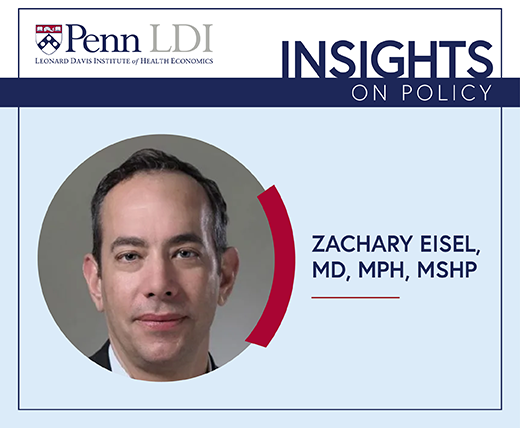
Estimated Overdose Deaths Due to the Loss of MOUD in the One Big Beautiful Bill Act
Research Memo: Delivered to House Speaker Mike Johnson and Majority Leader John Thune
Blog Post

The Affordable Care Act’s Medicaid expansion has been instrumental in improving health outcomes for those who gained coverage and for boosting the finances of providers across multiple U.S. health care sectors. However, the extent to which Medicaid expansion affects economic outcomes among health care workers, especially lower-income workers, is not well understood. These questions are key because, according to co-author and LDI Senior Fellow Paula Chatterjee, “the health care workforce has sizable wage inequality, and lower wage workers are more likely to be in poor health.”
In a recent study, LDI Fellows find that financial benefits from Medicaid expansion in health systems failed to reach the lowest earners. To understand the economic impacts of Medicaid expansion on workers’ annual incomes and their employer-sponsored health insurance, LDI Associate Fellow Sasmira Matta and Senior Fellows Chatterjee and Atheendar Venkataramani studied data from the American Community Survey (ACS), which included more than 1.3 million health care workers in 46 states between 2010 and 2019. They examined data from more than 800,000 health care workers in 30 expansion states and more than 500,000 health care workers in 16 non-expansion states. They focused on differences in outcomes between higher- and lower-income workers, before and after Medicaid expansion, between expansion and non-expansion states.
The researchers found that annual incomes for health care workers in Medicaid expansion states increased overall by slightly more than 2% after expansion relative to workers in non-expansion states. However, these increases were “driven by the highest-earning workers, which included registered nurses, physicians, and managers.” Lower-wage workers did not receive much economic benefit at all.
Financial benefits to health systems might not extend to the lowest earners in those systems. This finding is consistent with known occupational stratification in health care where lack of bargaining power and contract employment can limit gains for these workers.
– Paula Chatterjee, MD, MPH
Lower-income health care workers not only didn’t experience significant increases in annual incomes, these workers were more likely to be enrolled in Medicaid and less likely to receive employer-sponsored health insurance.
Overall, the study findings suggest that Medicaid expansions, which led to increases in financial earnings for health care organizations, “may have benefitted only a subset of workers in ways that can exacerbate economic inequality,” claim the investigators. Therefore understanding the impacts of revenue from Medicaid coverage expansion can help leaders and policymakers proactively address labor inequities within the health care workforce.
In conclusion, Chatterjee says that “low-wage health care workers are among the fastest growing sectors of the economy, are more likely to be women from minoritized groups, and face higher mortality risks. When you take all of this together, our findings suggest a potential mechanism by which health system finances may inadvertently contribute to structural marginalization.”
The study, “Changes in Health Care Workers’ Economic Outcomes Following Medicaid Expansion,” was published on February 27, 2024 in JAMA. Authors include Sasmira Matta, Paula Chatterjee, and Atheendar Venkataramani.


Research Memo: Delivered to House Speaker Mike Johnson and Majority Leader John Thune

Research Memo: Delivered to House Speaker Mike Johnson and Majority Leader John Thune

Hospitals’ Current Cost Reports are Unreliable and Should be Improved, LDI Fellow Finds

If Federal Support Falls, States May Slash Home- and Community-Based Services — Pushing Vulnerable Americans Into Nursing Homes They Don’t Want or Need

Historic Coverage Loss Could Cause Over 51,000 People to Lose Their Lives Each Year, New Analysis Finds

Cited for “Breaking New Ground” in the Field of Hospital Operations